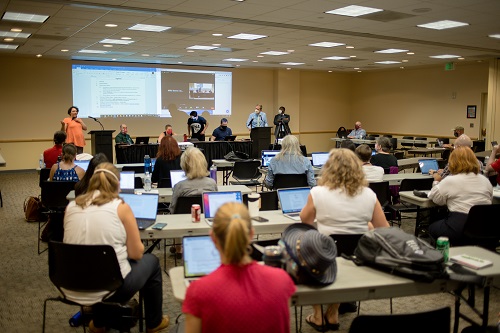Early Bird
Faculty Senate update
Faculty Workload Task Force update; National Survey of Student Engagement data; Undergraduate Research applications open early.
November 24, 2021
 Gabrielle Katz, Ph.D. (Earth and Atmospheric Sciences), provided Metropolitan State University of Denver’s Faculty Senate with an update on the Faculty Workload Task Force’s progress at the Senate’s Nov. 17 meeting.
Gabrielle Katz, Ph.D. (Earth and Atmospheric Sciences), provided Metropolitan State University of Denver’s Faculty Senate with an update on the Faculty Workload Task Force’s progress at the Senate’s Nov. 17 meeting.
The group was tasked in 2020 by then-interim Provost Bill Henry, Ph.D., and the Faculty Welfare Committee to tackle the longstanding issue of heavy teaching assignments. Since 2008, a number of Senate resolutions had addressed the issue; the most recent mandate looks at how to move to an 18-credit average annual workload for Category 1 faculty and a 24-credit average annual workload for Category 2, a reduction of six hours from current assignments for both faculty categories.
In addition to the changes proposed to be implemented as soon as possible, Katz discussed a differentiated-workload proposal tentatively targeted for fall 2025. This would see the development of three distinct models: a teaching-centered one, with over 18 hours in conjunction with reduced scholarship and service obligations; a balanced option, continuing the proposed 18-hour-plus scholarship-and-service split; and a scholarship/service-based modality, with fewer than 18 hours to offset the greater relative expected time allotment.
The Task Force’s work doesn’t exist within a vacuum, Katz noted, and is connected to conversations related to research, class size, enrollment trends and reassigned time.
Next steps include presenting to other campus constituent groups to solicit feedback, reviewing and incorporating that feedback in February for final recommendations in March before bringing the proposal to a vote in front of the Faculty Senate, the Council of Chairs and deans and then moving on to the provost for approval. Senate President Katia Campbell, Ph.D. (Communication Studies), thanked the group for its work and asked attendees to seek feedback from their departments.
Elizabeth Parmelee, Ph.D., associate vice president of Undergraduate Studies, stopped by to provide a brief overview of data from the National Survey of Student Engagement, also highlighted in a recent Early Bird article.
The NSSE measures first-year and senior-level students on academic experiences and engagement, comparing MSU Denver with other schools in the Rocky Mountain Public institutional designation. Response rates were 11% for first-year students and 20% for seniors.
Parmelee detailed measures of High-Impact Practices, including components such as service learning, faculty-led research opportunities, study-abroad opportunities and more, noting that students who partake in two or more components have a marked correlation with greater academic success.
MSU Denver performed lower than peer institutions in several areas among first-year students but narrowed the gap by their final year, Parmelee said, also noting the self-reporting nature of the NSSE and the extenuating impact of the pandemic. Eighty-four percent of seniors reported a positive satisfaction score, and 85% would repeat their academic experience, matching and besting peer schools, respectively.
Also of note was the University’s success in civic engagement, substantially outperforming comparative institutions.
“We’re really interested in how faculty members can access and use this data, along with how Undergraduate Research can support this process,” Parmelee said.
Other items of business included:
- Jessica Weiss, Ph.D. (Art), provided first reads on catalog changes to include School of Hospitality representation on grade appeals, revising the provost title and changing paraphrased interpretations on the Student Bill of Rights to directly quote the statutory language.
- Weiss also provided updates on the ongoing conversations about the proposed badging and micro-credential policy (Academic Policies Committee is assembling a task force to further address) and the “banking” policy to consider credit for leading internships, independent studies and directed teaching. As attendance did not reach a quorum, no voting on these second reads took place.
- Kelly Evans, Ph.D. (Human Performance and Sport), announced that the Rules Committee is working with the Executive Committee on hybrid functionality for meetings.
- Mandi Schaeffer Fry, Ph.D. (Mathematics), announced that registration for the Undergraduate Research Conference participation is opening earlier this year, on Dec. 6, allowing interested students to submit abstracts. Email undergradresearch@msudenver.edu with questions or for more information.
- Meredith Jeffers, Ph.D. (Modern Languages), provided an update on the unanimously approved proposals from the Curriculum Committee; details available here.
The final Faculty Senate meeting of 2021 will be Dec. 8 at 3:20 p.m.
Topics: Academics, Faculty Senate, Inclusive leadership, Policy
Edit this page